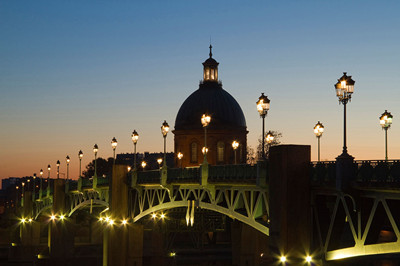法國經濟學家
Toulouse v Paris
圖盧茲VS.巴黎
A tale of two French economists and their rival schools
這是一個關于兩個法國經濟學家和他們競爭院校的故事
IF PHILOSOPHERS in France are national treasures, economists are dreary specimens. But the discipline has some new star dust. One French economist, Jean Tirole, won the Nobel prize for economics. Another, Thomas Piketty, brought in rock-star quality when his book, “Capital”, became a bestseller in English. When the IMF recently listed the world's 25 best young economists, seven (including Mr Piketty) were French.
如果法國的哲學家們是國寶,那么經濟學家們就是沉悶的標本。但是經濟學這一學科又有一些新動靜。一位法國經濟學家珍·泰勒爾贏得了諾貝爾經濟學獎。另外,托馬斯·皮凱提也在其著作《21世紀資本論》大熱之際博得了大眾眼球。當國際貨幣基金組織最近列出世界最佳年輕經濟學家,其中7名(包括皮凱提)是法國人。
An economist from Toulouse
What explains this resurgence? One answer is the rivalry of two institutions that have tried to defy the fragmented and divided world of French higher education: the Toulouse School of Economics (TSE) and the Paris School of Economics (PSE). Each has rebranded itself with an English name, created a private fund-raising foundation, recruited worldwide, and introduced English as the teaching language. Each has a claim to excellence: PSE (where Mr Piketty is a professor) ranks seventh among economics departments worldwide, and TSE (chaired by Mr Tirole) is 11th, according to the RePEc ranking used by economists.
為何會有這種復興呢?一種說法是因為兩大機構試圖對抗法國散亂的高等教育領域的競爭:圖盧茲經濟學院(TSE)和巴黎經濟學院(PSE)。每一所學院都重新為自己起了英文名,創建一個私人融資基金,在全球范圍內招募師資,并且引進英語作為課堂教學語言。每一所學院都聲稱自己卓越非凡:根據經濟學家們推崇的RePEc 排名,PSE(皮凱提在此任職教授)在全球經濟部門中位列第七,而TSE(由泰勒爾領導的學院)位列第11。

The two have chosen different paths. As part of a university, TSE is more recognisably a campus and teaches undergraduates (it cannot select them until the third year), while most of its postgraduates are foreign. The school's strengths are industrial economics, market regulation and economic theory. By contrast, PSE groups various grandes écoles, the selective elite top crust of French higher education, does not have a single campus (work on a new site is due to finish in 2016), and accepts only graduates. Besides economic theory, its research expertise is in public economics and statistics.
這兩所學院選擇了不同的道路。作為一所大學的一部分,TES更多地被視為一個學院并且教授本科生(它在大三之前不能挑選教授對象),同時它的研究生大多是留學生。學院的優勢是產業經濟學、市場監管和經濟理論。相比之下,PSE團隊的多樣化的grandes écoles,即有選擇性的法國高等教育精英課授教程,并不只施行在一個學院(2016年完成后選擇新任地點),并且只接收畢業生。除了經濟理論,它的研究專業是公共經濟學和統計學。
As a university, Toulouse has suffered in France from a sort of academic second-cousin syndrome. But the Nobel has put an end to that. A vast portrait of the modest Mr Tirole was strung across Toulouse's town hall. His students printed T-shirts to celebrate his triumph. Rivalry between the two schools is no bad thing. “As an economist, I like competition,” says Christian Gollier, TSE's director. “There is room for more than one prestigious economics department in France.”
在法國,圖盧茲作為一所大學患上了一種學術上的弗拉恩綜合癥。但是諾貝爾獎治好了這個病。謙遜的泰勒爾的巨大肖像畫貫穿了圖盧茲的市政廳。他的學生們印了T恤來慶祝泰勒爾的勝利。兩所學校的競爭并不是什么壞事。“作為一名經濟學家,我喜歡競爭,”TSE的主任克里斯蒂安·格里耶稱:“在法國遠不只有一所享有聲望的經濟學部。”
More than anything, TSE and PSE show how to get around rules. French higher education divides universities (non-selective) from grandes écoles(highly competitive); encourages uniformity (university lecturers are civil servants); and forbids university tuition fees. “The French system is crippled by rigidities,” notes Pierre-Yves Geoffard, PSE's director. “But these prompt new ideas, as a way of working around the system .”
最重要的是,TSE和PSE展現了如何繞過規則。法國高等教育將普通大學(無選擇性和grandes écoles(高競爭性)分開;鼓勵一致性(大學講師是公務員);并且禁止大學學收費。“法國的教育體系因此硬性要求而畸形發展,”PSE的主任皮埃爾·伊夫·吉歐法德。“但是,作為一種圍繞此系統工作的方式,這些缺陷同時也激發了新的想法。”譯者:邵夏沁 校對:張娣












